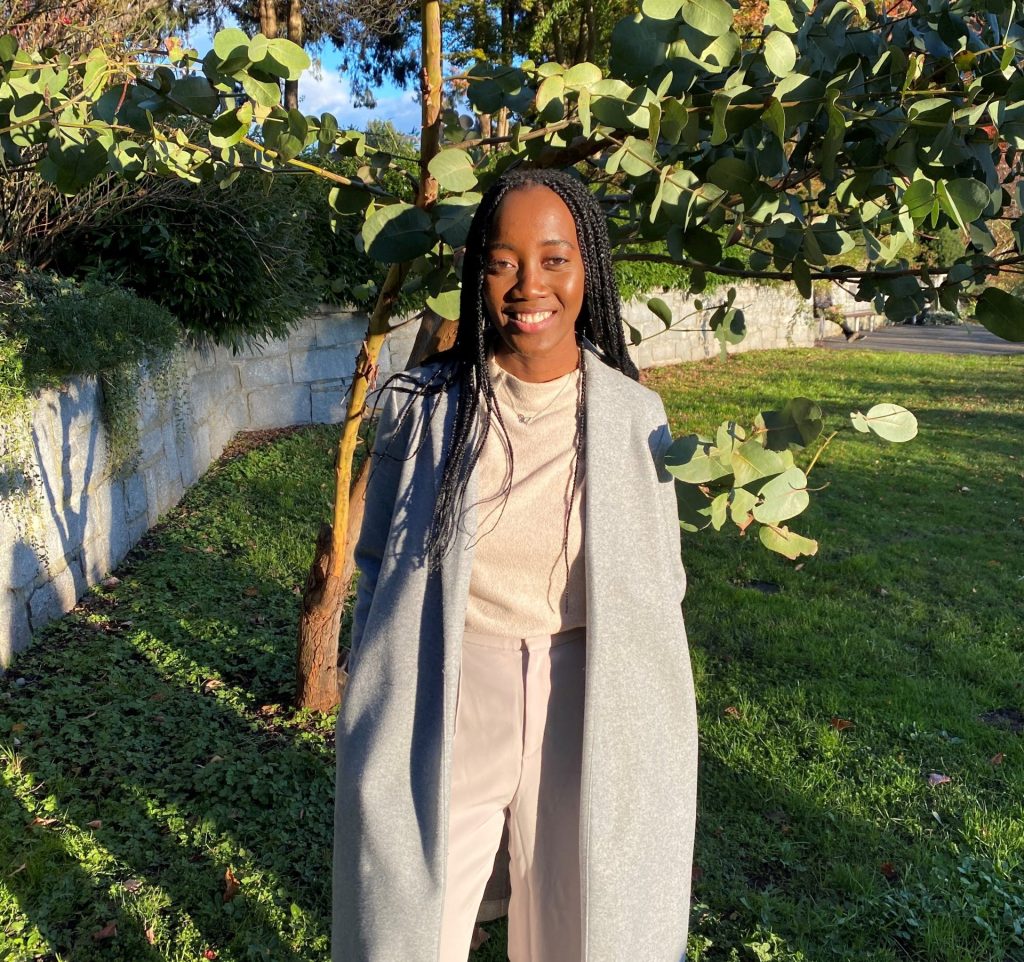
Cassandra Adjetey is an alum of the Master of Arts in Interdisciplinary Studies program at UBC Okanagan. She has a passion for patient-oriented approaches in healthcare decision-making. During her research at UBC Okanagan, Cassandra identified a gap specifically in patient-oriented treatment is in older adults with chronic stroke. Her thesis, Data Sharing Statement, addresses this topic and has been published in the medical journal, JAMA Network. Following her graduation from UBC Okanagan, Cassandra joined Interior Health as an Evaluation Specialist.
What drew you to the Master of Arts in Interdisciplinary Studies program at UBCO?
I chose the Interdisciplinary Studies program at UBCO due to the program’s emphasis on integrating diverse disciplines to foster collaborative learning. Given my experience in program evaluation within health research, I was interested in learning about ways to meaningfully engage interested parties throughout the evaluation process. The community engagement, social change, and equity (CESCE) theme of the program aligned perfectly with this goal, offering a platform to explore how to involve patients and other stakeholders as active contributors in research.
Moreover, the prospect of working closely with my supervisor, Dr. Jennifer Davis, who supervises graduate students in the community engagement, social change, and equity (CESCE) theme at UBCO, within the Applied Health Economics laboratory greatly appealed to me. Dr. Davis’ Applied Health Economics lab commitment to advancing patient-oriented approaches aimed at assessing the effectiveness of innovations for enhancing the quality of life among older Canadians provided a unique opportunity for immersive learning and practical application.
What inspired your thesis topic?
My goal was to develop proficiency in conducting applied health economic analyses. My thesis focused on evaluating the economic aspects of lifestyle interventions aimed at improving cognitive function among older adults with chronic stroke. This research was built upon a project guided by my supervisors Dr. Davis and Dr. Liu-Ambrose. Among the various projects within the lab, I was drawn to this topic due to the limited existing research on economic evaluations in stroke care, especially in the context of combatting cognitive decline. This presented a unique opportunity to explore this area, gain practical experience in economic research, and contribute to filling a significant research gap.
What were your biggest takeaways from the program?
I valued the unique chance to interact with individuals from a wide range of research disciplines and backgrounds. This exposure allowed me to acquire knowledge beyond my primary background in economics and quantitative research. I gained insights into various areas, including qualitative research methods, indigenous research approaches, and community-engaged research. As the field of health economics is increasingly incorporating patient engagement, it was particularly important to explore how lessons from other fields, which have a history of engaging with stakeholders, can be adapted and applied.
What was the most rewarding part of the program?
Truly, it was an opportunity to make meaningful connections and expand my professional network.
One of the highlights was the ability to collaborate with students and professors from different fields. This diversity of perspectives not only broadened my horizons but also enriched the quality of my research.
It allowed me to view my own work through various lenses and encouraged me to think beyond the boundaries of my own field. The chance to engage in interdisciplinary research activities was truly eye-opening. Moreover, it was incredibly rewarding to connect with experts and professionals in the field through conferences and research events. Building these relationships provided opportunities for mentorship and collaboration, which have proven to be beneficial for my professional growth.
What advice or insight would you give a prospective student considering this program?
I would encourage prospective students to build strong relationships with their supervisors and professors. These mentors play a crucial role in guiding your research and professional development. From my own experience, having a supervisor who not only provided valuable guidance and constructive feedback but also shared their wealth of experiences was immensely beneficial. It made navigating the intricacies of research and academia a much smoother journey. A great mentor-mentee relationship is built on mutual respect and trust. So, don’t hesitate to ask questions, seek their feedback, and leverage their knowledge. This program offers a wealth of knowledge and resources, and making the most of it requires active engagement and curiosity.
What are your career goals?
I currently work as an Evaluation Specialist with Interior Health. My recent academic training in Health Economics complements my prior experience in program evaluation. I am dedicated to applying this unique combination of skills and knowledge to contribute to healthcare decision-making. Specifically, I aim to employ an evaluative perspective to assess the efficiency of public health interventions to guide resource allocation in healthcare. As I work with Interior Health, I am committed to continuing to develop my health economics skillset, ensuring that I can make increasingly impactful contributions to the field.
Do you have anything else you would like to share?
I would like to extend my sincere gratitude to my supervisors, Dr. Davis and Dr. Liu-Ambrose, for their invaluable guidance and support throughout this program. I also wish to express my appreciation to my committee members, the dedicated individuals within the Applied Health Economic laboratory, the Aging, Mobility, and Cognitive Health lab, and my fellow colleagues at the Faculty of Management. It is through their collective efforts that my journey in this program has been exceptionally rewarding and truly delightful.
